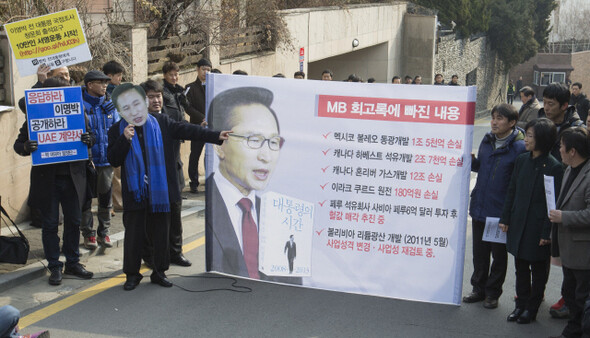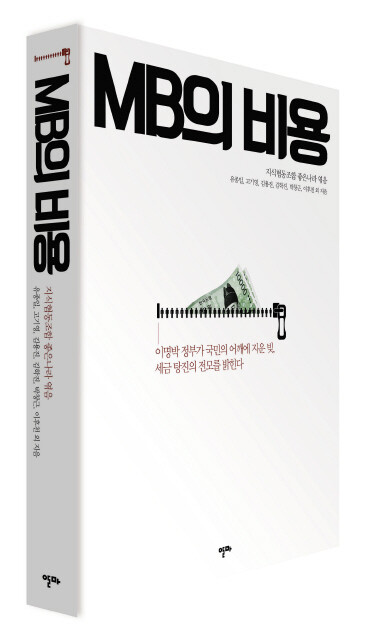hankyoreh
Links to other country sites 다른 나라 사이트 링크
New book tallies the massive waste of taxpayer money under former Pres. Lee MB

Lee Myung-bak, commonly known by the initials “MB,” was South Korean President from Feb. 2008 to Feb. 2013. He was elected with 48.67% of the popular vote, and he left office with an approval rating of 24% (according to Gallup). The release of Lee’s memoir “The President’s Time” on Feb. 2 has sparked a controversy over his “achievements” during his time in office.
Now a new book is countering the factual distortions and extravagant self-congratulation by noting the astronomical costs left behind by the administration: “The Costs of MB,” published by Alma.

The book, which is set for release on Feb. 9, was compiled by 16 experts in various areas, including Knowledge Cooperative for Good Governance (KCGG) chairman and KDI School of Public Policy and Management professor You Jong-il.
“The [Lee administration’s] tremendous waste of taxpayer money is something that must be addressed before we can move forward,” the book announces, before proceeding into a strictly economic analysis. “Financial waste” and “mismanagement” are the two major themes as the researchers present detailed numbers to document just how large the socioeconomic costs of the administration were. In particular, it notes a “cost” of at least 189 trillion won (US$173.5 billion) from Lee’s resource diplomacy efforts, Four Major Rivers Project, and corporate and upper class tax cuts.
Resource diplomacy costs are the one of the book’s major focuses. In terms of pure project costs, resource diplomacy efforts were more expensive at 31 trillion won (US$28.5 billion) than the Four Major Rivers Project, which cost 22 trillion won (US$20.2 billion). The issue is currently the subject of an ongoing parliamentary investigation. After identifying problems with South Korea’s overseas resource development efforts, the book notes that the three main state enterprises tasked with them - the Korea National Oil Corporation, Korea Gas Corporation, and Korea Resources Corporation - saw their debt rise by 42 trillion won (US$38.6 billion) after the administration left office. According to Hanshin University professor Ko Ki-young, these costs were the result of Lee’s resource diplomacy push. Lee claims in his memoir that the projects were expected to have a 114% total recovery rate, making more money than was invested in them - a point that the new book disputes.
The Four Major Rivers project may have been less costly than resource diplomacy in pure spending terms, but according to Catholic Kwandong University professor Park Chang-keun, the resulting costs of 84 trillion won (US$77.1 billion) are even greater than for the resource push. Besides the back-room deals that inflated the project costs, the careful analysis showed 6 trillion won (US$5.5 billion) lost from wetlands destruction, 1.3 trillion won (US$1.2 billion) per year in river maintenance, 2.5 trillion won (US$2.3 billion) for intake relocation, and 0.3 trillion won (US$280 million) in financing costs.
When the problem of algae on the Nakdong River surfaced in the fall two years ago, Lee justified the project by saying the blooms were “a sign that the water quality has improved.” It was You and the other KCGG‘s members “rage” at hearing this that inspired the publication, the book explains. In his memoirs, Lee claims that the “rivers and their bank areas are gaining vitality” as a result of the project.
“The Costs of MB” also calculates the costs of the “pro-business” Lee administration’s policies slashing 63 trillion won (US$57.8 billion) in taxes, including those due from corporations. A dialogue between You and Inha University professor Kang Byung-koo in the book makes it clear that the policies did not have the “job creation through investment” effect the administration claimed they would.

Besides the major projects and policies, the book examines the costs of a “Korean food globalization” effort spearheaded by First Lady Kim Yoon-ok and corruption in the nuclear power sector. It also points to a number of other Lee administration features - special treatment for companies like KT, POSCO, and Lotte, a break in inter-Korean relations, administration improprieties and unsuitable appointments, the emergence of a conservative-dominated media - which have had detrimental effects on South Korean society.
“The Costs of MB” amounts to an indictment against a twisted reality. In closing, You writes, “The perverse situation today is one where people who pushed the Four Major Rivers Project are not taking responsibility but exulting in government rewards, and where the people who wasted trillions of won on ‘developing overseas resources’ or ‘investing in Merrill-Lynch’ are, if anything, promoted. . . . There is no judgment or reckoning for past mistakes, and so the vices just keep growing.”
By Ryu Yi-geun, staff reporter
Please direct questions or comments to [english@hani.co.kr]

Editorial・opinion
![[Column] Park Geun-hye déjà vu in Yoon Suk-yeol [Column] Park Geun-hye déjà vu in Yoon Suk-yeol](https://flexible.img.hani.co.kr/flexible/normal/500/300/imgdb/original/2024/0424/651713945113788.jpg) [Column] Park Geun-hye déjà vu in Yoon Suk-yeol
[Column] Park Geun-hye déjà vu in Yoon Suk-yeol![[Editorial] New weight of N. Korea’s nuclear threats makes dialogue all the more urgent [Editorial] New weight of N. Korea’s nuclear threats makes dialogue all the more urgent](https://flexible.img.hani.co.kr/flexible/normal/500/300/imgdb/original/2024/0424/7317139454662664.jpg) [Editorial] New weight of N. Korea’s nuclear threats makes dialogue all the more urgent
[Editorial] New weight of N. Korea’s nuclear threats makes dialogue all the more urgent- [Guest essay] The real reason Korea’s new right wants to dub Rhee a founding father
- [Column] ‘Choson’: Is it time we start referring to N. Korea in its own terms?
- [Editorial] Japan’s rewriting of history with Korea has gone too far
- [Column] The president’s questionable capacity for dialogue
- [Column] Are chaebol firms just pizza pies for families to divvy up as they please?
- [Column] Has Korea, too, crossed the Rubicon on China?
- [Correspondent’s column] In Japan’s alliance with US, echoes of its past alliances with UK
- [Editorial] Does Yoon think the Korean public is wrong?
Most viewed articles
- 1‘We must say no’: Seoul defense chief on Korean, USFK involvement in hypothetical Taiwan crisis
- 2N. Korean delegation’s trip to Iran shows how Pyongyang is leveraging ties with Moscow
- 3‘Weddingflation’ breaks the bank for Korean couples-to-be
- 4[Reportage] On US campuses, student risk arrest as they call for divestment from Israel
- 5Amnesty notes ‘erosion’ of freedom of expression in Korea in annual human rights report
- 6[Column] Park Geun-hye déjà vu in Yoon Suk-yeol
- 7Korea sees more deaths than births for 52nd consecutive month in February
- 8[Editorial] New weight of N. Korea’s nuclear threats makes dialogue all the more urgent
- 9Will NewJeans end up collateral damage in internal feud at K-pop juggernaut Hybe?
- 10[Guest essay] The real reason Korea’s new right wants to dub Rhee a founding father